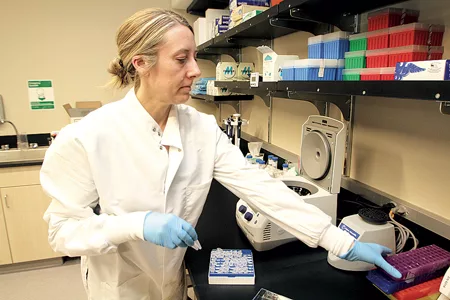Signature Genomics co-founder starts new venture
Ex-Signature Genomics CEO Shaffer launches Paw Print to test dogs

Signature Genomics co-founder Lisa Shaffer and her husband, Jeff, are starting a new genetic testing venture—this time for testing people's pooches.
The company, Paw Print Genetics, aims to help dog breeders nationwide avoid unhealthy genetic traits in their animals, Lisa Shaffer says. The lab, which will test canines for inherited diseases, is gearing up for a March launch, she says.
"We're bringing genetic testing up to human standards," Shaffer says of Paw Print Genetics.
Paw Print has six employees in addition to the Shaffers and occupies 2,000 square feet of leased space in the McKinstry Innovation Center, at 850 E. Spokane Falls Blvd.
"The space was built out to our specifications, so it's a beautiful laboratory," says Shaffer, a geneticist who's no stranger to such laboratories.
Paw Print also plans to hire a genetic counselor who will help guide clients to appropriate testing, she says. The counselor also will help interpret the results and recommendations.
"Clients will receive a report that will have a results section with interpretations and recommendations," Shaffer says. "The counselor will help customers before they order tests and after they get the report, if they have questions."
In 2003, Shaffer and Dr. Bassem Bejjani founded Signature Genomic Laboratories LLC, a Spokane biotech company that provides genetic testing for children with developmental disabilities. Waltham, Mass.-based health technology services provider PerkinElmer Inc., acquired Signature Genomic for $90 million in 2010.
While genes in individual humans tend to be similar, each dog breed has unique genetic characteristics, Shaffer says.
"What makes a dachshund a dachshund and a Great Dane a Great Dane are slightly different sets of genetic mutations," she says. "How those genes function is what makes them different. Basically, breeders are selecting desirable traits."
Some of the gene mutations that cause desired traits also can be accompanied by mutations that cause diseases, Shaffer says. Many tests can detect genes responsible for diseases that aren't evident in young dogs, but show up later in their lives, such as blindness in Labrador retrievers, and a stress-related sleeping condition called narcolepsy common in dachshunds, she says.
"Our mission is to improve the genetic health of dog breeds," Shaffer says. "We want to help breeders avoid medical problems with mutations."
Ideally, owners should screen dogs for genetic predispositions to certain diseases before breeding—or they should screen puppies before they buy them, Shaffer says.
Paw Print will have capabilities to test for more than 130 genetic disorders—far more than most other animal testing labs in the U.S. which on average test for less than a dozen genetic disorders, Shaffer asserts.
Depending on the number of tests ordered, results will take two to four weeks. Tests on puppies will be given priority, "just like in the human world in which babies are tested first," Shaffer says.
Costs will depend on individual orders. "As you put more diseases into the test, the price per disease goes down," she says. "Our goal is to test for more different diseases for the money than other labs."
Paw Print will be a national reference laboratory, Shaffer says. It will send DNA sample collection kits with cheek swabs for clients to obtain cells from their dogs to submit to the lab for analysis.
"People in town can call and make an appointment, and we'll meet them outside," Shaffer says. To avoid contamination risks, dogs won't be allowed inside the lab, she says.
Paw Print's mascot is the Shaffers' miniature dachshund, Trixie, who's also the namesake for the Trixie the Wiener Dog blog on Facebook that the Shaffers started and that specializes in issues regarding canine genetics.
Shaffer says Paw Print will use such social media to reach owners of the 22 million breeding dogs in the U.S.
The Shaffers also have two large mixed-breed dogs, Bruno and Gracie.
Related Articles


_c.webp?t=1763626051)
_web.webp?t=1764835652)

